- Home
- Piers Anthony
Executive Page 27
Executive Read online
Page 27
Then I got more personal. “I have come to know you men as I worked in this company,” I said. “But you are the minority. We all know that we have quite a number of inadequately trained and motivated workers and deadwood executives. We are not going to fire any of them, but we are going to demote them. If they wish to leave the company, we’ll gladly let them go. But those who stay will be well treated here. We are going to treat every worker as a winner, as someone special. We are going to treat every client as someone valuable. We are going to care about our people. We are going to be like one giant family. We are going to provide medical assistance for any worker who needs it, and day care for the children of any worker who wants it, and honest counseling for any worker who asks for it. Each of you will be like a parent to your group, and I will be a parent to you and a grandparent to them. We are going to have love here—love of our product and love of our customers and love of each other. We are going to have company-sponsored entertainment. If one employee marries another, we will give them a wedding on company premises at company expense. If one of our employees dies, the company will cover the memorial service and will offer what support we can to the survivors. Religious services and political meetings will be welcome, provided that no proselytizing or recruiting is done on company premises. And we shall sing together.”
Still they gazed at each other uncertainly, half suspecting that I was not serious. The changes I was proposing were too great, too different. They simply didn’t know what to make of it. No paperwork? Weddings on company premises? Singing?
“Now, we are going to make mistakes,” I continued. “That is inevitable. We shall be tolerant of errors, while avoiding total foolishness. We are going to be highly hospitable to new ideas, to innovation, to alternatives. We—”
I paused, for one of the company men had moved quietly to a door and flung it open. A man was revealed there, listening.
“Ah, a spy!” I exclaimed, recognizing the intruder. I had checked out all suspicious characters and knew that this man was in the employ of Saturn, an industrial agent. I had used my facilities as Tyrant privately to get information on him directly from the source: Chairman Khukov had provided it. “Come forward!”
Apprehensively the man approached me. “Comrade, we have nothing to fear from Saturn!” I informed him. “We need have no secrets here. Come to my office in the morning, and I will provide you with any information you desire. I hope that your planet will reciprocate. I appoint you company liaison to Saturn. Now we shall welcome you warmly.” And, as the others stared with astonishment, I began to sing the Saturn anthem: “Meadowlands, Meadowlands, meadows green and fields in blossom!” I gestured to the others to join me. Most were blank, but some did know the song; hesitantly they joined in. Gray laughed and sang loudly; he was no Saturnist and loved the joke. In due course we were singing it with greater enthusiasm, and indeed, it is a pretty song.
That, I think, was what broke the ice. After we had sung together we felt more like a family. The people I had chosen began to believe in this seemingly crazy dream of mine, to fathom the way in which it could operate. I stepped off the platform, still singing, and took the hands of those nearest, and they took the hands of others, and soon all of us were linked in a big circle, including the Saturn spy, moving our feet in time and swaying our bodies in a kind of dance. On one level it was indeed crazy, but on another it was the essence of what I wanted: company unity.
I was taking a serious risk in this, and I knew it, but I felt that the importance of the move warranted it. You see, what I was doing here was very like what I had done as an officer of the Jupiter Navy, thirty years before, and much more recently as Tyrant. Few people had my talent for understanding and influencing others; it was the principal trait that had brought me to the Tyrancy. I was using it freely here, openly for the first time. If any of these caught on ...
I think, in retrospect, that it is possible that some did. But if so, they did not betray my identity to others. Perhaps it was curiosity that moved them, waiting to see what I was up to. Or perhaps they liked what I was doing with the company, so supported it despite their knowledge.
• • •
It was much like chaos at first. Our output and our cost-effectiveness plummeted. But I had expected this, and I had had a good deal of experience in this sort of thing. The new lines of command rapidly took form, and as the new formations formed, the work improved. Naturally great numbers of employees left, in perplexity or horror, but we worked to keep the ones we really wanted. Always we fostered the feeling of family, of total commitment and support, of the importance of every single person associated with Jupiter Bubble. We stressed endlessly the concurrent commitments to quality. Every worker became a quality control expert, passing on no work that was not, in his judgment, up to snuff. We hired personnel to take care of the increasing number of children in the day-care unit. There were none under two years of age, because of the procreation cutoff, but women with children in the three-to-five year old range flocked to our banner, because here they could work for a fair wage without having to sacrifice their children. A number of them were quite competent, and they were dedicated from the start.
We also attracted creative males: those who had been stifled at other companies, who wanted to be respected, to have their novel notions seriously considered, and to feel important. We soon had capacity employment, and a waiting list developed for potential employees. Indeed, they liked it here—not for superior pay, for our scale was standard, but for the feeling of worth as individuals they experienced here. In return they gave us their best effort, and in an amazingly brief time the benefits accrued.
Of course, I am oversimplifying here; there were endless details to cover and continuing minor crises to accommodate, and the process took years. But Spirit ran the Tyrancy while I made spot appearances as Tyrant, and Amber was the appropriate contrast to the stresses of company and Tyrancy management, being a completely malleable young woman who lived only to please me. It may be unkind to say it, but had my other lives been anything other than hectic, I would soon have gotten bored with Amber. But as it was, she represented a calm haven and constant sop to my aging masculine ego, and I found I could live with that. Oh, true, at times I dreamed of the glories of my past life, when Helse had initiated me into the magic realms of sex and love, when Emerald had managed my Navy career toward the apex, and when fiery Roulette had dazzled me—as perhaps she still did. But I knew I was no longer fifteen, or twenty-two, or thirty; I was passing my mid-fifties, and physically and sexually I was not the man I had been. Emotionally and intellectually I remained viable, I trusted. The proof of my current manhood was in the progress of the company—and that was part of the progress of the Tyrancy.
But at this stage that proof was far from apparent. When I was about a year into my presidency of the company, a significant event occurred, though I was not to appreciate just how significant for another year. My business took me to the great city of Cago, in the State of Prairie, a center for the food industry. I had a peripheral interest in food production, a matter I shall go into in due course. I was traveling as Jose Garcia, of course; it would hardly have been feasible as Tyrant.
I had just about concluded my business when the trouble started. I was departing the mayor’s office, having taken care of some paperwork, and saw that a demonstration was in progress. Curious, I joined the throng in the main hall to watch. The demonstrators were mostly young, and a number of them—perhaps the majority—were female. They held placards proclaiming, GIVE US OUR BABIES and NIX ON NUL-POP!
Now I understood. These were the first people who felt the onus of the population control measure now in force. I knew that it was necessary to halt the exploding population of the System, and that the United States of Jupiter could not dictate population control to the other nations of the planet; we had to set the example ourselves. That was working, but at this stage, the benefits were less apparent than the sacrifice. The festering slum-cities of RedS
pot, the result of overpopulation that depleted its resources, seemed far away, while the denial of babies to the families of Cago seemed immediate. Naturally they felt it keenly. I understood this, but, of course, the policy could not be changed until planetary growth had been gotten under control. So the young would-be mothers marched in protest, and they certainly looked ready to reproduce. As Tyrant I knew why this had to be, but as Garcia, I had sympathy for their cause.
I knew that such demonstrations had been increasing, for as women grew older, their chances of bearing healthy children diminished, and their desperation increased. The ban on babies would be lifted in due course, but for some women, that would be too late. The situation had been especially serious here in Cago; I had been warned of this before I traveled here, but that had not dissuaded me from getting my business done. There had been some unpretty episodes.
There was one today. As I watched, a quite comely young woman strode to the entrance to the mayor’s complex, carrying a suitcase. The police guards at the entrance watched, evidently more interested in her appearance than her message.
The woman stood before the entrance, set down her case, and removed her blouse. One guard had taken a step, about to escort her away from the region, but stopped. What man would interfere with a beautiful woman in the process of disrobing before him?
Disrobe she did. In moments she stood gloriously naked. Then she stretched out her arms. “What use is this body to me if I cannot have my baby?” she cried. Then she bent to touch a stud on the case.
“Watch out!” a guard cried. “That’s a bomb!”
The guards charged, but the case had been activated. It flared, bathing the woman in intense light.
“No—that’s an incendiary laser!” I exclaimed, starting forward myself.
All of us were too late. The woman shrieked as her skin was scorched from her body, a thin veil of smoke rising. Those lasers were used to incinerate garbage, eliminating the problem of collection and disposal; they were normally set at intervals in residential areas, for neighborhoods to use. This one had evidently been partially dismantled, its protective housing removed, so that it represented a danger to the user.
The woman fell, writhing. Her hair and much of her skin had been burned away, and she was dying in as painful a manner as was possible. The two guards stood over her body, appalled. So was I; I was sure that her medical expense limit had been used up, so that she would not be treated. She would certainly die, which was what she had intended.
“What a waste!” one grunted. “Body like that—”
“Pigs!” a woman in the crowd cried, and hurled a fruit.
The guard whirled, drawing his sidearm. His laser flashed, and someone in the crowd screamed.
I did not see much more than that, for I was making a hasty retreat. I knew that real trouble was about to flare, and for my own safety I wanted to win clear of it while that was possible.
For a while I wasn’t sure of that possibility. The immolation had electrified the crowd, and the lasering of a demonstrator had galvanized it to action. All manner of objects were flying at the mayor’s office now: vegetables, shoes, coins, and even feces.
More guards rushed out of the office complex, lasers drawn. More beams were fired, and there were more screams amid the crowd. I ducked low, knowing that anything could happen, while the missiles and beams crossed over me. I found myself beside a young woman, a demonstrator, who had similar sense. “Oh, this is getting out of hand!” she exclaimed. “There’ll be the Tyrant to pay!”
Interesting figure of speech. “Would the Tyrant really get involved?” I asked. “This seems to be focusing on the mayor.”
“The Tyrant would do anything,” she said darkly. “The mayor couldn’t stay in power a moment if the Tyrant didn’t back him.”
I pondered that as the mayhem increased. It was no longer feasible to retreat; the throng was surging angrily forward, growing as it came. We remained huddled in an alcove. I, in my guise as Tyrant, had not favored the Mayor of Cago, though he was of my party; I regarded him as a regressionary force and perhaps a racist. But his power was solidly entrenched, and I had had plenty of problems to keep me busy without seeking new ones. Thus Cago had been relatively untouched by the Tyrancy; its local political machine remained intact. Only Tyrancy programs like population control affected the natives here directly. It was a program the mayor supported, however, so evidently he had become the symbol of its implementation here. The Tyrant was a more distant figure, therefore less objectionable. An interesting perspective.
But now, as I observed the viciousness with which the police of Cago pitched in to the fray, it occurred to me that the population measure might be only an incidental symbol of a greater grudge. I had known that the mayor kept a tight rein on his domain, running the city mainly to please himself. Apparently direct force was the principal component of this control. Those lasers were dangerous, even if set at nonlethal intensity.
A beam seared into the wall above my head, gouging a channel. Nonlethal? That was kill-focus!
The incident had become a pitched battle. The broad hall was now jammed with people, most of them plowing determinedly forward. There were bodies on the floor, but far too many living people for a few police with lasers to stop. The throng surged on, overrunning the police, and I heard the cursing and thudding as fists and feet pounded the downed men. This crowd was now more than angry, it was ferocious!
Then they were crowding into the office complex, whence new screams sounded. “They’re raiding the mayor’s staff!” I exclaimed.
“We hate the mayor and all he stands for,” the woman said. “It’s a den of thieves.”
Evidently so. Now the throng in the hall was thinning as it drained into the office complex, and we were able to stand. “This isn’t over,” the woman said darkly. “I never meant to get involved in violence. I’m going home.”
“And I’m going back to the airport,” I agreed. “Nice meeting you, Miss—”
“Mrs.,” she said. “Culver. My husband didn’t want me to get involved in the demonstration; now I know why!” She glanced at my good clothing. “And you are—?”
“Jose Garcia,” I said, expecting her to forget the name as soon as she heard it.
I was disappointed. “Garcia!” she exclaimed. “The Garcia?”
“Uh, I don’t know how many there are.”
“Jup Bub? The good employer?”
“Yes, I am with—”
“Oh, you must come and meet my husband!” she said. “He’s always admired your style.”
“I’m just trying to run the company properly,” I protested. But she was hauling me on, and it seemed easiest to follow. At least it would get us clear of this region of riot.
As we reached her cell the news was being broadcast: A mob had taken over the mayor’s office and was holding him and his staff hostage for city reforms, starting with the Pop-Null program. That was wrongheaded, I knew, but how was one to reason with a mob?
Mr. Culver was indeed happy to make my acquaintance. It seemed that I had become something of a hero to the working class in the year I had been running Jupiter Bubble. I had not realized this and was flattered. It had been some time since my days as a rising Hispanic politician, honored by the masses, and I enjoyed the return of this role. In the persona of Jose Garcia I had returned to the essence of Hope Hubris.
But events proceeded inexorably onward. The mayor had sent out a distress call, and it seemed that the Tyrant was indeed answering. I was sure it was Spirit at the helm, operating in my name as always. But I discovered that firm action did not appear the same from the worm’s eye view I now had, as it did from above.
Because the mob had threatened to murder the mayor and his staff if any attempt were made to rescue him, and because it had the power and evident incentive to do it, the Tyrancy acted indirectly. A valve was opened in the hull of the city-bubble, and the Jupiter atmosphere started leaking in. It would take some time for the press
ure to rise significantly, but there was horror the moment this was announced. The pressure of the external atmosphere was a terror, and any break in the integrity of the hull was alarming. The valve was filtered, so that no actual poisons entered, but still, the threat was potent.
“The valve will be closed when the mayor of Cago and his staff are released unharmed and the offices vacated without vandalism,” the Navy officer in charge of this proceeding announced on the city address system.
“I knew there’d be the Tyrant to pay!” Mrs. Culver wailed. “He stands behind his own.”
This bothered me. Of course, the Tyrancy had to support the mayor, but this was nothing personal. Privately I would have preferred to be rid of the mayor. I disliked being in the position of brutalizing an entire city to save this brutal mayor’s hide. But what could I say?
“This has gone too far,” Mr. Culver said. “That mob will never give over—and neither will the Tyrant. We’ll all pay for this foolishness—and for what? For opposition to a policy we know in our hearts is necessary.”
I was getting to like this man.
His wife was subdued. “You’re right, of course. There’s nothing I want so much as having our baby, but riot and murder isn’t the way! We’ve got to get out of this somehow.”
Easier said than done. Hard on the news of the valve came the news of the city’s reaction. Angry workers attempted to storm the valve—and were mowed down by the disciplined lasers of the Navy troops. There was no bluffing here; they were shooting to kill. After fifteen were dead the attack abated, but the city as a whole was twice as fearful and angry. I was wincing at all of it; this was being seriously mishandled. No further deaths had been necessary, and it was doubly unfortunate that they were occurring in the name of the Tyrancy. But what could I do from this vantage?

 Serial
Serial Question Quest
Question Quest Chthon
Chthon Dragon on a Pedestal
Dragon on a Pedestal E. S. P. Worm
E. S. P. Worm Hope of Earth
Hope of Earth The Series Boxed Set
The Series Boxed Set Blue Adept
Blue Adept The Sopaths
The Sopaths Beetle Juice
Beetle Juice Awares
Awares Golem in the Gears
Golem in the Gears Geis of the Gargoyle
Geis of the Gargoyle Bamboo Bloodbath and Ninja's Revenge
Bamboo Bloodbath and Ninja's Revenge Heaven Cent
Heaven Cent Neq the Sword
Neq the Sword Pandora Park
Pandora Park Juxtaposition
Juxtaposition Bearing an Hourglass
Bearing an Hourglass Dragon Assassin
Dragon Assassin Board Stiff
Board Stiff Virtual Mode
Virtual Mode Castle Roogna
Castle Roogna Aliena Too
Aliena Too Pet Peeve
Pet Peeve The Metal Maiden Collection
The Metal Maiden Collection Volk
Volk Phaze Doubt
Phaze Doubt The Color of Her Panties
The Color of Her Panties Amazon Slaughter and Curse of the Ninja Piers Anthony
Amazon Slaughter and Curse of the Ninja Piers Anthony The Worm Returns
The Worm Returns Zombie Lover
Zombie Lover Xone of Contention
Xone of Contention The Gutbucket Quest
The Gutbucket Quest Split Infinity
Split Infinity Dream a Little Dream: A Tale of Myth and Moonshine
Dream a Little Dream: A Tale of Myth and Moonshine Balook
Balook Out of Phaze
Out of Phaze The Secret of Spring
The Secret of Spring Mouvar's Magic
Mouvar's Magic Cube Route
Cube Route Mercenary
Mercenary Total Recall
Total Recall Man From Mundania
Man From Mundania The Magic Fart
The Magic Fart Letters to Jenny
Letters to Jenny Jack and the Giants
Jack and the Giants Executive
Executive Robot Adept
Robot Adept On A Pale Horse
On A Pale Horse Vale of the Vole
Vale of the Vole Crewel Lye
Crewel Lye For Love of Evil
For Love of Evil Spider Legs
Spider Legs Mute
Mute Being a Green Mother
Being a Green Mother Hair Suite
Hair Suite Air Apparent
Air Apparent Politician
Politician Aliena
Aliena Phthor
Phthor Ghost Writer in the Sky
Ghost Writer in the Sky Pornucopia
Pornucopia Eroma
Eroma Shepherd
Shepherd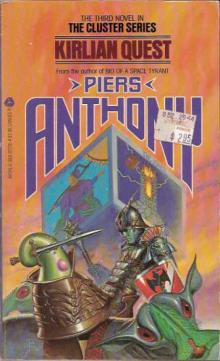 Kirlian Quest
Kirlian Quest Swell Foop
Swell Foop God of Tarot
God of Tarot If I Pay Thee Not in Gold
If I Pay Thee Not in Gold Amazon Expedient
Amazon Expedient Faun & Games
Faun & Games Vision of Tarot
Vision of Tarot Centaur Aisle
Centaur Aisle Serpent's Silver
Serpent's Silver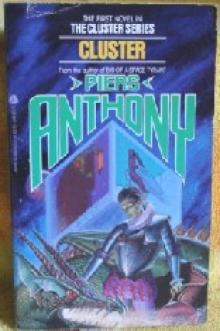 Cluster
Cluster With a Tangled Skein
With a Tangled Skein Chaining the Lady
Chaining the Lady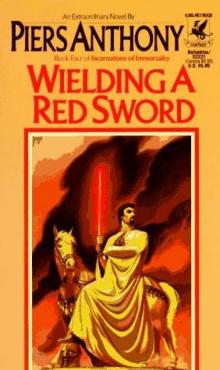 Wielding a Red Sword
Wielding a Red Sword Key to Chroma
Key to Chroma WereWoman
WereWoman Isis Orb
Isis Orb Hair Peace
Hair Peace Two to the Fifth
Two to the Fifth Viscous Circle
Viscous Circle Skeleton Key
Skeleton Key Cautionary Tales
Cautionary Tales The Source of Magic
The Source of Magic Unicorn Point
Unicorn Point Writer's Retweet
Writer's Retweet Demons Don't Dream
Demons Don't Dream Ogre, Ogre
Ogre, Ogre The Iron Maiden
The Iron Maiden Tortoise Reform
Tortoise Reform Luck of the Draw
Luck of the Draw A Spell for Chameleon
A Spell for Chameleon Yon Ill Wind
Yon Ill Wind Currant Events
Currant Events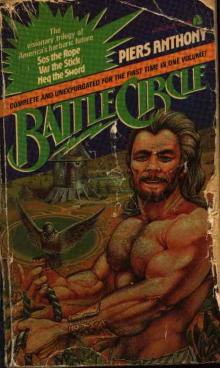 Var the Stick
Var the Stick And Eternity
And Eternity Kiai! & Mistress of Death
Kiai! & Mistress of Death Chimaera's Copper
Chimaera's Copper Refugee
Refugee Isle of View
Isle of View Thousandstar
Thousandstar Mer-Cycle
Mer-Cycle Service Goat
Service Goat Five Portraits
Five Portraits Night Mare
Night Mare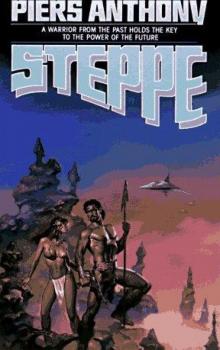 Steppe
Steppe Lavabull
Lavabull Well-Tempered Clavicle
Well-Tempered Clavicle Aladdin Relighted
Aladdin Relighted Aladdin and the Flying Dutchman
Aladdin and the Flying Dutchman Knot Gneiss
Knot Gneiss Roc and a Hard Place
Roc and a Hard Place Aladdin Sins Bad
Aladdin Sins Bad Flytrap
Flytrap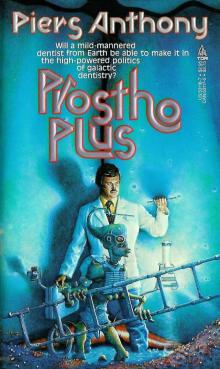 Prostho Plus
Prostho Plus Esrever Doom
Esrever Doom Hair Power
Hair Power The Journey
The Journey Virtue Inverted
Virtue Inverted Of Man and Manta Omnibus
Of Man and Manta Omnibus Trail Mix: Amoeba
Trail Mix: Amoeba Noah's Brick
Noah's Brick Odd Exam
Odd Exam Magenta Salvation
Magenta Salvation Jest Right
Jest Right Fire Sail
Fire Sail Chthon a-1
Chthon a-1 Amoeba
Amoeba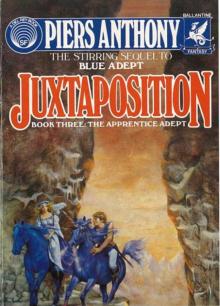 Juxtaposition aa-3
Juxtaposition aa-3 Pira
Pira THE CATERPILLARS QUESTION
THE CATERPILLARS QUESTION What Fears Become: An Anthology from The Horror Zine
What Fears Become: An Anthology from The Horror Zine Bio of a Space Tyrant Vol. 3. Politician
Bio of a Space Tyrant Vol. 3. Politician Ogre Ogre x-5
Ogre Ogre x-5 Rings of Ice
Rings of Ice On a Pale Horse ioi-1
On a Pale Horse ioi-1 Luck of the Draw (Xanth)
Luck of the Draw (Xanth) Centaur Aisle x-4
Centaur Aisle x-4 Thousandstar (#4 of the Cluster series)
Thousandstar (#4 of the Cluster series) Gutbucket Quest
Gutbucket Quest Isle of Woman (Geodyssey)
Isle of Woman (Geodyssey) Chaining the Lady c-2
Chaining the Lady c-2 To Be a Woman
To Be a Woman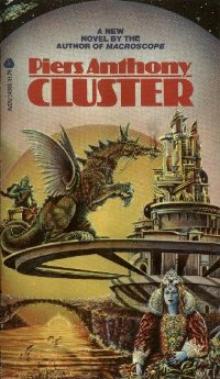 Cluster c-1
Cluster c-1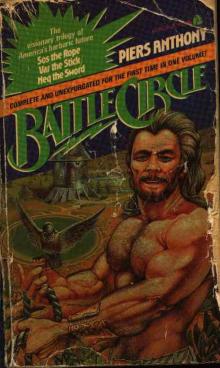 Battle Circle 2 - Var the Stick
Battle Circle 2 - Var the Stick Mercenary (Bio of a Space Tyrant Book 2)
Mercenary (Bio of a Space Tyrant Book 2)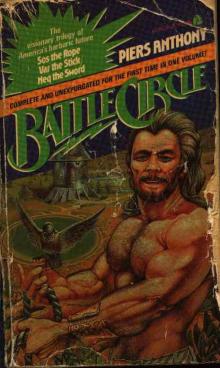 Battle Circle 1 - Sos the Rope
Battle Circle 1 - Sos the Rope Xanth 30 - Stork Naked
Xanth 30 - Stork Naked Secret of Spring
Secret of Spring Xanth 29 - Pet Peeve
Xanth 29 - Pet Peeve Serpents's Silver
Serpents's Silver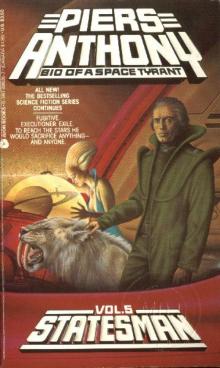 Statesman by Piers Anthony
Statesman by Piers Anthony Out of Phaze aa-4
Out of Phaze aa-4 Amazon Slaughter & Curse of the Ninja
Amazon Slaughter & Curse of the Ninja